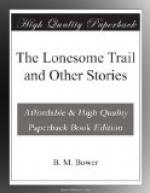“If you had an atom of decency you’d be ashamed to mention that tribute to your diabolical marksmanship.”
“Oh, mamma!” ejaculated Weary under his breath, and began to make himself a smoke. His guardian angel was exhorting him to silence, but it preached, as usual, to unsentient ears.
“I never mentioned all those things,” he denied meekly. “It’s you that keeps on mentioning. I wish yuh wouldn’t. I like to hear you talk, all right, and flop all those big words easy as roping a calf; but I wish you’d let me choose your subject for yuh. I could easy name one where you could use words just as high and wide and handsome, and a heap more pleasant than the brand you’ve got corralled. Try admiration and felicitation and exhilarating, ecstatic osculation—” He stopped to run the edge of paper along his tongue, and perhaps it was as well he did; there was no need of making her any angrier. Miss Satterly hated to feel that she was worsted, and it was quite clear that Weary had all along been “guying” her.
“If you came here to make me hate you, you have accomplished your errand admirably; it would be advisable now for you to hike.”
Weary, struck by that incongruous last word, did an unforgivable thing. He laughed and laughed, while the match he had just lighted flared, sent up a blue thread of brimstone smoke, licked along the white wood and scorched his fingers painfully before he remembered his cigarette.
Miss Satterly turned abruptly and went into the house, put on her hat and took up the little, tin lard-pail in which her aunt Meeker always packed her lunch. She was back, had the key turned in the lock and was slowly pulling on her gloves by the time Weary recovered from his mirth.
“Since you will not leave the place, I shall do so. I want to say first, however, that I not only think you odious, but all the synonyms I mentioned besides. You need not come for me to go to the Labor Day dance, because I will not go with you. I shall go with Joe.”
Weary gave her a startled glance and almost dropped his cigarette. This seemed going rather far, he thought—but of course she didn’t really mean it; the schoolma’am, he heartened himself with thinking, was an awful, little bluffer.
“Don’t go off mad, Girlie. I’m sorry I killed your gopher—on the dead, I am. I just didn’t think, That’s a habit I’ve got—not thinking.
“Say! You stay, and we’ll have a funeral. It isn’t every common, scrub gopher that can have a real funeral with mourners and music when he goes over the Big Divide. He—he’ll appreciate the honor; I would, I know, if it was me.”
The schoolma’am took a few steps and stopped, evidently in some difficulty with her glove. From the look of her, no human being was within a mile of her; she certainly did not seem to hear anything Weary was saying.
“Say! I’ll sing a song over him, if you’ll wait a minute. I know two whole verses of ‘Bill Bailey,’ and the chorus to ‘Good Old Summertime.’ I can shuffle the two together and make a full deck. I believe they’d go fine together.




